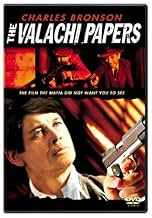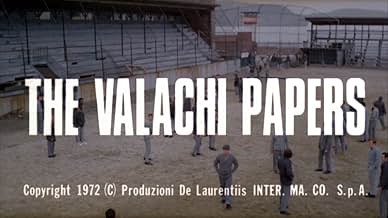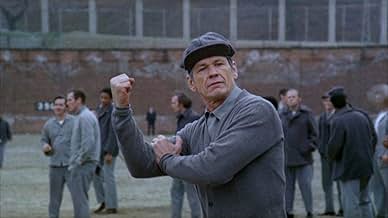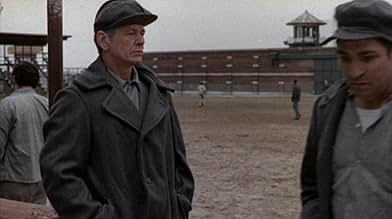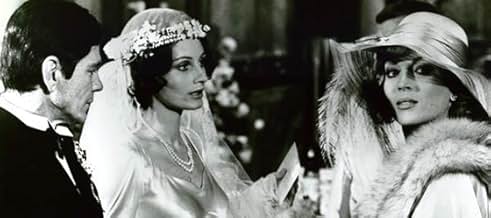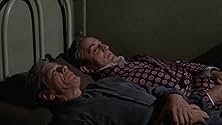IMDb RATING
6.4/10
4.9K
YOUR RATING
Gangster Joe Valachi is a marked man in the same joint where mob boss Don Vito Genovese is imprisoned and he's forced to co-operate with the DA in exchange for protection.Gangster Joe Valachi is a marked man in the same joint where mob boss Don Vito Genovese is imprisoned and he's forced to co-operate with the DA in exchange for protection.Gangster Joe Valachi is a marked man in the same joint where mob boss Don Vito Genovese is imprisoned and he's forced to co-operate with the DA in exchange for protection.
Gerald S. O'Loughlin
- Ryan
- (as Gerald O'Loughlin)
Featured reviews
I give this a 7 stars because it was made the same year as Godfather I, so it didn't benefit from all the film-industry wisdom that followed that production. Rather, this is a character study of one mafioso, which is a separate issue from the operatic, all-systems-GO no-holds-barred approach Coppola was able to employ in The Godfather. it's a smaller film, and should be compared to, say, Mobsters (1991), which deals with the same period and some of the same characters as V.P. Charles Bronson's Valachi is adequate. He's a workaday, uneducated, down- home mob guy, and Bronson plays him as if he were Polish, with a job that he goes to every day, where everyone talks Italian. Because it is through his eyes that we see his world, some of the other characters become more vivid, e.g., Joseph Wiseman as Salvatore Maranzano. When I compare the casting of the incomparable Joseph Wiseman in this role as opposed to, say, Michael Gambon in the same role in Mobsters, or Anthony Quinn as an equally old-school rival in the same film, I wonder: None of these actors are Italian -American or even simply Italian; why do some of them work, and the others don't? Granted that Wiseman, Quinn and Gambon are all consummate professionals and true craftsmen as actors, if anyone mentions Salvatore Maranzano and the Castellammarese gang war of 1929, the face that will come to my mind is that of Joseph Wiseman. He and Charles Bronson make this film worth seeing.
Charles Bronson starts to break out of spaghetti westerns and good character roles and becomes a leading man around the time The Valachi Papers came out. It was a big milestone in his career, playing the most famous gangster stoolie of all.
It's not quite true that all Valachi's testimony managed to do was get a lot of high television ratings for some re-election hungry Senators. Not that they didn't get it and didn't appreciate the side benefits of those famous televised hearings, but eventually what came out of the Valachi hearings was the RICO law which has in fact put quite a dent into organized crime.
The Valachi Papers has Charles Bronson telling FBI man Gerald S. O'Loughlin about his life and times in organized crime with La Cosa Nostra from the days of the Marranzano-Masseria wars until the present which would have been 1962. He doesn't really tell anything new to them, basically he confirms what had been gangster legend about the circumstances of many a demise. But with some hard documentation now, new laws are created to meet the problem.
Bronson does his best with Valachi, but the story has him pretty one dimensional. It's far from The Godfather where you really get inside the characters of the fictional Corleone family. Bronson sure has no conscience about what he did and I'm sure the real Valachi didn't either. In fact the only reason he turns informer is that Vito Genovese already mistakenly has him down as one.
Fans of the gangster genre and Charles Bronson should give this one a look. Others should see The Godfather all three parts.
It's not quite true that all Valachi's testimony managed to do was get a lot of high television ratings for some re-election hungry Senators. Not that they didn't get it and didn't appreciate the side benefits of those famous televised hearings, but eventually what came out of the Valachi hearings was the RICO law which has in fact put quite a dent into organized crime.
The Valachi Papers has Charles Bronson telling FBI man Gerald S. O'Loughlin about his life and times in organized crime with La Cosa Nostra from the days of the Marranzano-Masseria wars until the present which would have been 1962. He doesn't really tell anything new to them, basically he confirms what had been gangster legend about the circumstances of many a demise. But with some hard documentation now, new laws are created to meet the problem.
Bronson does his best with Valachi, but the story has him pretty one dimensional. It's far from The Godfather where you really get inside the characters of the fictional Corleone family. Bronson sure has no conscience about what he did and I'm sure the real Valachi didn't either. In fact the only reason he turns informer is that Vito Genovese already mistakenly has him down as one.
Fans of the gangster genre and Charles Bronson should give this one a look. Others should see The Godfather all three parts.
One of the other reviewers to The Valachi Papers makes the suggestion through his review heading that "It probably didn't help that this came out the same year as The Godfather". Ironically the release of The Valachi Papers was brought forward to 1972 from its original 1973, to cash in on the huge publicity and general buzz The Godfather was creating world wide. Because of such an occurrence it's difficult not to compare and contrast both films, especially since their content involves Mafia stories. At the same time, their main point of difference as the above reviewer again correctly points out, is that The Godfather is a fictional work, whilst Terence Young's The Valachi Papers is based on Peter Maas's non-fiction book of the same name.
I'm always amused particularly after watching historical fiction, when fans argue the case over historical veracity, with the frequent protest being tendered, that some scene or episode wasn't real enough or true to the facts, bearing in mind that anything not labelled documentary in my view, has a licence to take artistic liberties with the truth to enhance the story. A perceptive audience will generally always know and be aware of changes made.
The Godfather is a masterpiece of cinematic storytelling and in the telling of the tale, there are also significant insights into the workings of a fictional Mafia operation.
The Valachi Papers in my opinion is a good film about a middle level Mafia soldier and his life in the Cosa Nostra amongst many real life gangsters. It's a truer story than The Godfather, but not of the same quality and neither is the film. It's worth remembering that both films were commercially successful, though The Godfather was the mega-hit. The Valachi Papers was less critically successful too. In fact many of the critics, in my opinion were unjustifiably harsh, though I do understand from where they are coming.
Terence Young is guilty of following the book too closely. His story is just too episodic in nature.There's no smooth narrative flow. There's Joe Valachi doing something in 1929 and there he is again in 1937 etc. Though always interesting, it isn't helped by us continually returning to the (1962) present, where Joe is being interviewed/interrogated by the FBI guy Ryan. I liked the movie, but its uneven pacing is notable. Just another very brief example. We see Joe get married in your typical Italian Mafia wedding. The next time we actually see he and his wife together, they are middle-aged!
But don't be put off. In my opinion the Valachi Papers is still a very interesting film which features one of Charles Bronson's better performances, where he is really forced to act and to enunciate a lot more dialogue than you'd normally see him do. After all, he's in about 95% of the movie's scenes. One of the few times I can remember him playing a real life figure. It's a worth while watch.
I'm always amused particularly after watching historical fiction, when fans argue the case over historical veracity, with the frequent protest being tendered, that some scene or episode wasn't real enough or true to the facts, bearing in mind that anything not labelled documentary in my view, has a licence to take artistic liberties with the truth to enhance the story. A perceptive audience will generally always know and be aware of changes made.
The Godfather is a masterpiece of cinematic storytelling and in the telling of the tale, there are also significant insights into the workings of a fictional Mafia operation.
The Valachi Papers in my opinion is a good film about a middle level Mafia soldier and his life in the Cosa Nostra amongst many real life gangsters. It's a truer story than The Godfather, but not of the same quality and neither is the film. It's worth remembering that both films were commercially successful, though The Godfather was the mega-hit. The Valachi Papers was less critically successful too. In fact many of the critics, in my opinion were unjustifiably harsh, though I do understand from where they are coming.
Terence Young is guilty of following the book too closely. His story is just too episodic in nature.There's no smooth narrative flow. There's Joe Valachi doing something in 1929 and there he is again in 1937 etc. Though always interesting, it isn't helped by us continually returning to the (1962) present, where Joe is being interviewed/interrogated by the FBI guy Ryan. I liked the movie, but its uneven pacing is notable. Just another very brief example. We see Joe get married in your typical Italian Mafia wedding. The next time we actually see he and his wife together, they are middle-aged!
But don't be put off. In my opinion the Valachi Papers is still a very interesting film which features one of Charles Bronson's better performances, where he is really forced to act and to enunciate a lot more dialogue than you'd normally see him do. After all, he's in about 95% of the movie's scenes. One of the few times I can remember him playing a real life figure. It's a worth while watch.
I truly think if this film had come out earlier it would today be thought of as a better film. After all, it's FAR better than its current rating of 6.8. That's because 1972 was the same year that "The Godfather" debuted and the utter greatness of "The Godfather" probably overwhelmed "The Valachi Papers"---as both touch on very similar subject matter. The main difference is that "The Godfather" was based fictionalized characters and had a true elegance about the film. "The Valachi Papers" in contrast was a much more straight forward story based on real mob figures--and it's a dandy film.
The film begins in the early 1960s. Mobster Joseph Valachi is in prison and multiple attempts are made on his life. It seems that someone in the organization has talked--and the mob of bosses, Genovese (Lino Ventura) believes it was Valachi. And, not surprisingly, a contract has been placed on Valachi's head. This has the unintended consequence of forcing Valachi to to authorities. Almost all the rest of the film consists Valachi giving his story to the government agent. What follows is a very long story about Valachi's earliest days in the mob (about 1930) up to the arrest that brought him to prison--and a bit beyond.
The story is helped a lot by the films's length--a little over two hours. You'd need at least this much to tell such a long and complicated story. It also helps that Charles Bronson is given some excellent support. Among the many wonderful actors, one really surprised me--Lino Ventura. I've seen him in many French films (mostly Pierre Melville productions) and have LOVED his acting--he plays a great mobster--cold and tough. I never realized that he spoke English so well--everything I've seen him in up until now has been in French. Here, he very credibly plays an Italian-American! The script also was quite good. While not quite as human and interesting as "The Godfather", it sure was good...very, very good.
There's almost nothing negative I could say about the film other than very minor things. Bronson was too old for this role. When the film began he was supposed to be 27--but looked about twice that. Also, a few times anachronistic elements somehow made their way in--such as cars that were from the wrong time period. But, as I said, this is all very minor.Aside from this, a top quality production that deserves more recognition. Gritty, exciting and fascinating as well.
By the way, although IMDb lists the movie as being rated PG, the version I saw was way too bloody and filled with nudity to have been rated PG. The lesbian scene along would have merited a rating of R. Perhaps this was a director's cut or perhaps it was not rated PG or perhaps there were just multiple versions.
The film begins in the early 1960s. Mobster Joseph Valachi is in prison and multiple attempts are made on his life. It seems that someone in the organization has talked--and the mob of bosses, Genovese (Lino Ventura) believes it was Valachi. And, not surprisingly, a contract has been placed on Valachi's head. This has the unintended consequence of forcing Valachi to to authorities. Almost all the rest of the film consists Valachi giving his story to the government agent. What follows is a very long story about Valachi's earliest days in the mob (about 1930) up to the arrest that brought him to prison--and a bit beyond.
The story is helped a lot by the films's length--a little over two hours. You'd need at least this much to tell such a long and complicated story. It also helps that Charles Bronson is given some excellent support. Among the many wonderful actors, one really surprised me--Lino Ventura. I've seen him in many French films (mostly Pierre Melville productions) and have LOVED his acting--he plays a great mobster--cold and tough. I never realized that he spoke English so well--everything I've seen him in up until now has been in French. Here, he very credibly plays an Italian-American! The script also was quite good. While not quite as human and interesting as "The Godfather", it sure was good...very, very good.
There's almost nothing negative I could say about the film other than very minor things. Bronson was too old for this role. When the film began he was supposed to be 27--but looked about twice that. Also, a few times anachronistic elements somehow made their way in--such as cars that were from the wrong time period. But, as I said, this is all very minor.Aside from this, a top quality production that deserves more recognition. Gritty, exciting and fascinating as well.
By the way, although IMDb lists the movie as being rated PG, the version I saw was way too bloody and filled with nudity to have been rated PG. The lesbian scene along would have merited a rating of R. Perhaps this was a director's cut or perhaps it was not rated PG or perhaps there were just multiple versions.
This is an unfairly underrated crime film directed by Terence Young for whom it is also one of his best, a movie where he put all his "guts", if I may say. Charles Bronson and Lino Ventura, two heavies of the US and French cinema playing together, only missed Marcel Bozzuffi and Leo Gordon....yes, it is an accurate and detailed document about actual events, without excessive useless, gratuitous violence as we often saw in Italian polizziotescos of this period, the seventies. But it remains brutal, bloody in a factual violence, factual and not gratuitous. No clichés nor good guys vs evil ones scheme either. I am sure that many French Lino Ventura buffs don't know this film. Such a shame.
Did you know
- TriviaIn return for using the penitentiary grounds of the Sing Sing Correctional Facility, the production made a large contribution to the prison's recreation fund.
- GoofsDuring the chase scene which takes place during the 1920s in New York, a car goes into the river and in the background the twin towers of the World Trade Center under construction can be clearly seen. This is one of the most famous period reconstruction mistakes in film history.
- Quotes
Tony Bender: "Cut it off!" Bender to his two henchman as they grab Gap to get a "present" for Don Vito's girlfriend.
- Alternate versionsTo receive an 'X' certificate the UK cinema version received heavy cuts to scenes of violence including the castration scene, bloody shootings, and the meat hook killing. Video and DVD releases restore the cuts.
- ConnectionsFeatured in Valachi: The Violent Era (1972)
- How long is The Valachi Papers?Powered by Alexa
Details
Box office
- Budget
- $5,000,000 (estimated)
- Runtime
- 2h 5m(125 min)
- Color
- Aspect ratio
- 1.85 : 1
Contribute to this page
Suggest an edit or add missing content


